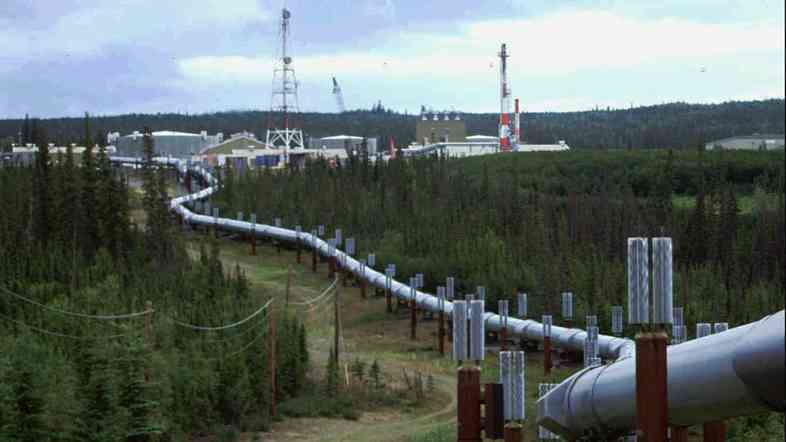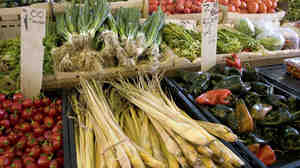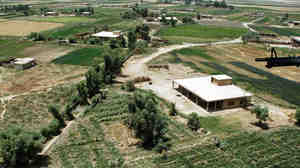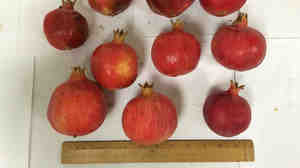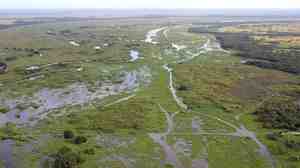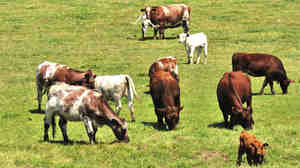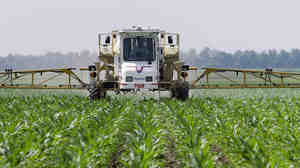Oil, carried here by the Trans-Alaska Pipeline, is fundamental to the state's economy. But Alaskans also face the effects of climate change in their daily lives. Al Grillo/AP hide caption
An adult spotted lanternfly is seen, its wings spread to show a colorful hind wing. The invasive pest has sparked a quarantine in Pennsylvania. Holly Raguza/Pennsylvania Department of Agriculture hide caption
Edgar Meadows has been growing Bloody Butcher corn, an heirloom variety, for generations. The name Bloody Butcher refers to the flecks of red mixed onto the white kernels, like a butcher's apron, Meadows says. Roxy Todd/West Viginia Public Broadcasting hide caption
Manuel Pulgar-Vidal, Peru's Minister of Environment, U.N. Secretary-General Ban Ki-moon, Intergovernmental Panel on Climate Change (IPCC) Chairman Rajendra Pachauri and Renate Christ, Secretary of the IPCC present the Synthesis Report during a news conference in Copenhagen on Sunday. Scanpix Denmark/Reuters/Landov hide caption
Mount Etna erupted on March 28, 1983. Lava flows destroyed homes and tourist destinations causing millions of dollars' worth of damage. Teams scrambled to divert the massive flow. Courtesy of John Lockwood hide caption
The Bracken Bat Cave outside San Antonio is home to millions of bats. Here, a few of them emerge from the colony in 2011. Eric Gay/AP hide caption
Lava near the leading edge of the flow oozes over a concrete slab and toward a tangerine tree before solidifying near the town of Pahoa on the Big Island of Hawaii earlier this week. U.S. Geological Survey/AP hide caption
Confused about all the different sustainability ratings out there? The simplest option may be to shop at your local farmer's market. iStockphoto hide caption
Farms outside Baghdad as seen from a U.S. Army Blackhawk helicopter. Much of Iraq's soil has a high salt content because of flooding and poor drainage. Jim Gordon/U.S. Army Corps of Engineers/Flickr hide caption
These scuba divers are among the 2 million tourists who visit the Great Barrier Reef each year. They contribute about $5.6 billion to Australia's economy, according to the Queensland government. Steve Dorsey for NPR hide caption
These pomegranates are about an inch smaller than the typical size, but they're packed with antioxidants. Courtesy of Tiziana Centofanti hide caption
The San Luis Reservoir in central California is the largest "off-channel" reservoir in the U.S. It is currently at less than 30 percent of its normal capacity. Kirk Siegler/NPR hide caption
The restoration's goal is to put as much of the Kissimmee as possible back to the way it was. This photo shows the river after restoration. Courtesy the South Florida Water Management District hide caption
Workers drill for oil in the Bakken shale formation outside Watford City, N.D., an area experiencing an oil boom. Andrew Burton/Getty Images hide caption
Researchers say there's plenty the beef industry can do to use less land and water and emit fewer greenhouse gas emissions. But producers may need to charge a premium to make those changes. iStockphoto.com hide caption
Corn farmer Jerry McCulley sprays the weedkiller glyphosate across his cornfield in Auburn, Ill., in 2010. An increasing number of weeds have now evolved resistance to the chemical. Seth Perlman/AP hide caption


